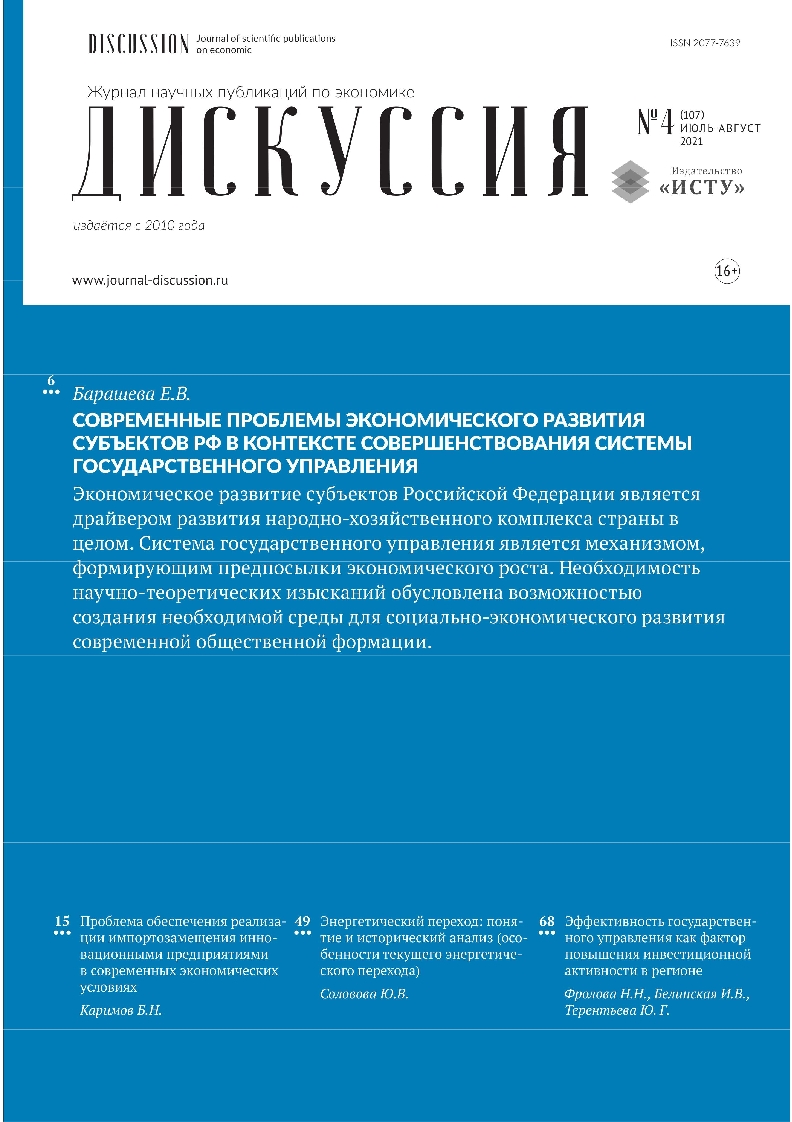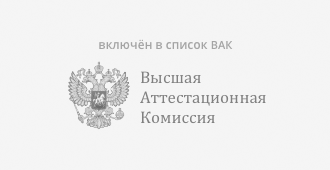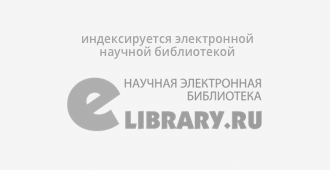Scientific crowdfunding market in Russia: analysis and assessment of prospects
Keywords:
Crowdfunding for science, scientific communication, innovative development, crowdfunding platform, science funding, science and education, success factors, sponsorship.Abstract
One of the main problems of Russian science is the lack of sufficient funding. State funding is the major source of providing research work in Russia. This study provides an overview of scientific crowdfunding in Russia as a new tool for financial support and research funding. The study examines the prospect of crowdfunding as a tool for financing and stimulating initiatives in Russian science. Within the framework of this study, an analysis of the current situation on the scientific crowdfunding market and an assessment of the directions of its development in Russia were carried out. It was revealed that the United States is the world center of crowdfunding. American crowdfunding platforms occupy most of the crowdfunding market share. The Russian market of scientific crowdfunding is not a full-fledged tool that can currently become an alternative to state financing. The theoretical analysis carried out within the framework of this scientific research convincingly shows that the national market of scientific crowdfunding is concentrated only on Planeta.ru and Boomstarter, the largest crowdfunding platforms of the country. It was revealed that creative and cultural crowd-funding projects are the leaders of the Russian crowdfunding market. It was also revealed that Planeta.ru is the first Russian platform that opened a special category for scientific research.
It was found that the scale of accumulated funds of scientific projects of Planeta.ru exceeds Boomstarter. According to the results of the theoretical analysis, it was also found that Planeta.ru has more effective long-term strategy for the development and stimulation of scientific initiatives, and Boomstarter has more efficient short-term management decisions. On the one hand, scientists use crowdfunding as a source of co-financing of research or as an alternative to grant support, on the other hand, they do not accept such a fundraising tool. Based on the results of the analysis of interviews and literature, the tools for promotion of scientific crowdfunding and stimulation of its growth that include educational activities, the presence of crowdfunding producers in science and a model of synergy of information resources of academic structures and the experience of crowdfunding platforms, were identified. Educational activities are aimed at popularizing scientific crowdfunding, as well as encouraging more authors to use this tool and increasing the percentage of financially successful projects.
Downloads
Metrics
References
Vachelard J, Gambarra-Soares T, Augustini G, Riul P, Maracaja-Coutinho V A Guide to Scientific Crowdfunding. PLoS Biol 14 (2): e1002373. (Feb., 2016). Stable URL: https://doi.org/10.1371/journal.pbio.1002373, доступ свободный, дата обращения 15.09.2021;
Аскеров А.А. Клаудплатформы как альтернативный источник финансирования инновационных проектов / А.А. Аскеров, И.Н. Дубина, Р.К. Сагиева // Экономика. Профессия. Бизнес – №1 – 2019 – С. 5-10;
Месропян Э.Р. Научный краудфандинг в России: развитие рынка и факторы успеха проекта. Национальный исследовательский университет ИТМО. (Июнь, 2021). Stable URL: https://nauchkor.ru/pubs/nauchnyy-kraudfanding-v-rossii-razvitie-rynka-i-faktory-uspeha-proekta-60e2fca3e4dde5000192349f, доступ свободный, дата обращения 15.09.2021;
Bi S., Liu Z. Y., Usman K. The influence of online information on investing decisions of reward-based crowdfunding // Journal of Business Research – vol. 71 – 2017. – P. 10-18
Kuppuswamy V., Bayus B. L. Crowdfunding creative ideas: The dynamics of project backers in Kickstarter // UNC Kenan-Flagler Research Paper – No. 2013- 15. – 2015. – p. 42
Мотовилов, О.В. Феномен краудфандинга: исследование особенностей / О.В. Мотовилов // Вестник Санкт-Петербургского университета. Экономика. – 2018. - №2 – С. 298-317
E. Wheat Rachel, Wang Yiwei, Byrnes Jarrett E., Ranganathan Jai. Raising money for scientific research through crowdfunding. Volume 28, Issue 2, (February, 2013), pp. 71-72. Stable URL: https://doi.org/10.1016/j.tree.2012.11.001, доступ свободный, дата обращения 15.09.2021;
Borrero-Domínguez et al. Analysis of success factors in crowdfunding projects based on rewards: A way to obtain financing for socially committed projects. /Cinta Borrero-Domínguez, Encarnación Cordón-Lagares, Rocío Hernández-Garrido// Helyion, Volume 6, Issue 4, (April 09, 2020). Stable URL: https://doi.org/10.1016/j.heliyon.2020.e03744, доступ свободный, дата обращения 15.09.2021;
Schwienbacher, A., Larralde, B. Crowdfunding of small entrepreneurial ventures. In: Cumming, D.J. (Ed.), The Oxford Handbook of Entrepreneurial Finance. Oxford University Press, Oxford, (30 Oct., 2010), pp. 1-23. Stable URL: https://dx.doi.org/10.2139/ssrn.1699183, доступ свободный, дата обращения 15.09.2021;
Davies, R. Civic Crowdfunding: Participatory Communities, Entrepreneurs and the Political Economy of Place. Massachusetts Institute of Technology. (18 May, 2014), p. 173. Stable URL: https://dx.doi.org/10.2139/ssrn.2434615, доступ свободный, дата обращения 15.09.2021;
Sajardo, A., Gil, M., Perez, S. El Sector no lucrativo en el marco de la nueva era tecnologica: el desafío del Crowdfunding social en Espana. Analisis del caso de la asociacion Alba Perez, lucha contra el cancer infantil. REVESCO. Revista de Estudios Cooperativos 124, (2017), pp. 128–151. DOI: 10.5209/REVE.56132
Cumming, D., Johan, S., Zhang, Y. The role of due diligence in crowdfunding platforms. J. Bank. Finance Volume 108, (November, 2019). Stable URL: https://doi.org/10.1016/j.jbankfin.2019.105661, доступ свободный, дата обращения 15.09.2021;
Jahnke, A. Who picks up the tab for science? – [Электронныйисточник] – Режимдоступа: http://www.bu.edu/research/ articles/funding-forscientificresearch/ (датаобращения: 15.09.2021 г.);
Точка зрения. Краудфандинг в науке. Мнения экспертов // ПостНаука – [Электронный источник] – Режим доступа: https://postnauka.ru/talks/33772 (дата обращения: 15.09.2021 г.);
Davidson, R., Poor, N. Factors for success in repeat crowdfunding: why sugar daddies are only good for Bar-Mitzvahs. // Information, Communication & Society– 2016. – P. 127-139;
Patel, N. Crowdfunded Science Is Here. But Is It Legit Science? // Wired – [Электронный источник] – Режимдоступа: https://www.wired.com /2015/04/crowdfunded-science-legit-science/?fbclid=IwAR2QeqyOUFHq-HD9tyc c7-EMnyjiu23a8VEAcOceuTAylKwGTT5gKSd-HRc (дата обращения: 15.09.2021 г.).
Downloads
Published
How to Cite
Issue
Section
Categories
License
Copyright (c) 2021 Э.Р Месропян, О.А Евсеева

This work is licensed under a Creative Commons Attribution-NonCommercial-NoDerivatives 4.0 International License.
Авторы, публикующие произведения в журнале «Дискуссия», соглашаются со следующими условиями:
- Авторы сохраняют за собой авторское право и предоставляют журналу право первой публикации произведения, одновременно лицензированной в соответствии с лицензией Creative Commons Attribution, позволяющей другим лицам пользоваться произведением с подтверждением авторства и первоначальной публикации в журнале «Дискуссия».
- Авторы вправе заключать с иными лицами лицензионные договоры на условиях простой (неисключительной) лицензии на использование опубликованного в журнале «Дискуссия» произведения (например, размещение его в базах данных университетов, публикация в книге), со ссылкой на его оригинальную публикацию в этом журнале.
- Автор гарантирует, что является правообладателем всех материалов, предоставляемых в редакцию, и что исключительные права на данные материалы не переданы или не предоставлены другим лицам.
- Авторам разрешено и рекомендуется размещать свое произведение в Интернете до и во время процесса подачи, поскольку это может привести к продуктивному обмену, а также к более раннему и более широкому цитированию опубликованных работ.
С момента загрузки произведения и сопроводительных материалов через раздел "Отправка материалов", автор полностью и безоговорочно принимает (акцептует) публичную оферту о заключении авторского соглашения об опубликовании произведения. В соотвтетствии с этим соглашением автор предоставляет издателю на безвозмездной основе неисключительную лицензию на использование созданного автором произведения.
С момента получения произведения и прилагаемых к нему материалов журнал "Дискуссия" вправе использовать полученные произведения без ограничений по своему усмотрению и в пределах всего срока действия исключительных прав, но с обязательным указанием имени автора (авторов) произведения, в том числе публиковать произведения (полностью или в сокращении) на территории всего мира, переводить на другие языки, направлять в репозитории научной информации, размещать в сети Интернет и использовать другими законными способами.









